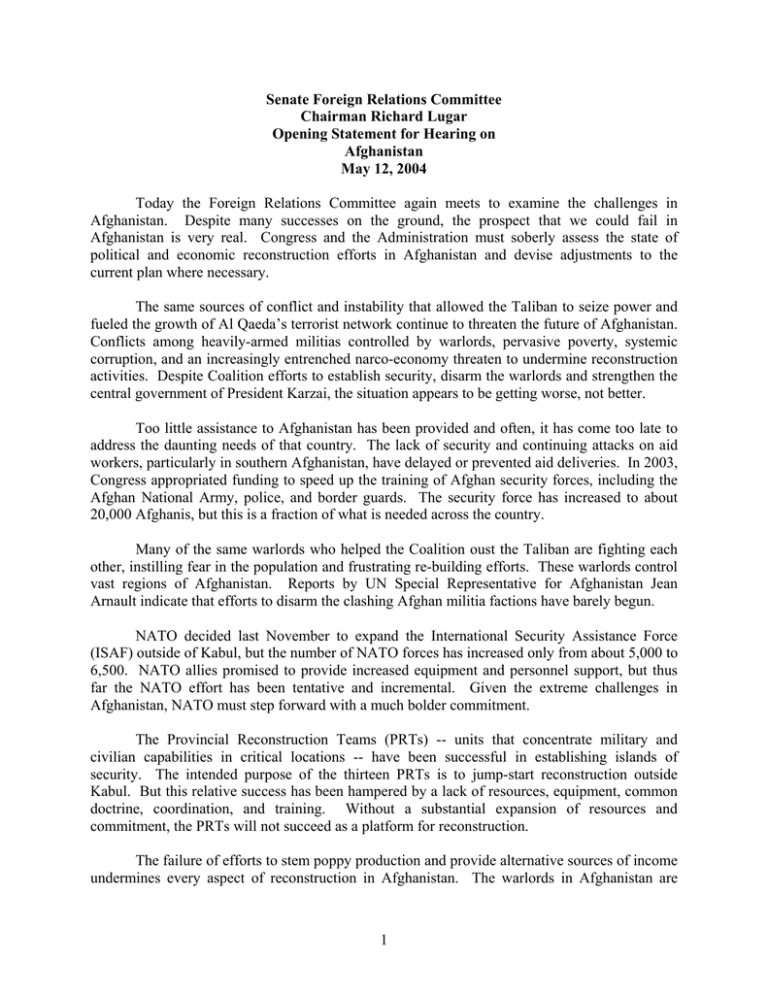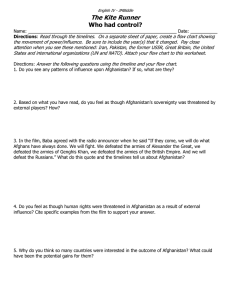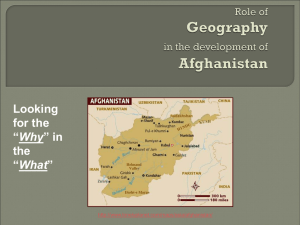Senate Foreign Relations Committee Chairman Richard Lugar Opening Statement for Hearing on Afghanistan
advertisement

Senate Foreign Relations Committee Chairman Richard Lugar Opening Statement for Hearing on Afghanistan May 12, 2004 Today the Foreign Relations Committee again meets to examine the challenges in Afghanistan. Despite many successes on the ground, the prospect that we could fail in Afghanistan is very real. Congress and the Administration must soberly assess the state of political and economic reconstruction efforts in Afghanistan and devise adjustments to the current plan where necessary. The same sources of conflict and instability that allowed the Taliban to seize power and fueled the growth of Al Qaeda’s terrorist network continue to threaten the future of Afghanistan. Conflicts among heavily-armed militias controlled by warlords, pervasive poverty, systemic corruption, and an increasingly entrenched narco-economy threaten to undermine reconstruction activities. Despite Coalition efforts to establish security, disarm the warlords and strengthen the central government of President Karzai, the situation appears to be getting worse, not better. Too little assistance to Afghanistan has been provided and often, it has come too late to address the daunting needs of that country. The lack of security and continuing attacks on aid workers, particularly in southern Afghanistan, have delayed or prevented aid deliveries. In 2003, Congress appropriated funding to speed up the training of Afghan security forces, including the Afghan National Army, police, and border guards. The security force has increased to about 20,000 Afghanis, but this is a fraction of what is needed across the country. Many of the same warlords who helped the Coalition oust the Taliban are fighting each other, instilling fear in the population and frustrating re-building efforts. These warlords control vast regions of Afghanistan. Reports by UN Special Representative for Afghanistan Jean Arnault indicate that efforts to disarm the clashing Afghan militia factions have barely begun. NATO decided last November to expand the International Security Assistance Force (ISAF) outside of Kabul, but the number of NATO forces has increased only from about 5,000 to 6,500. NATO allies promised to provide increased equipment and personnel support, but thus far the NATO effort has been tentative and incremental. Given the extreme challenges in Afghanistan, NATO must step forward with a much bolder commitment. The Provincial Reconstruction Teams (PRTs) -- units that concentrate military and civilian capabilities in critical locations -- have been successful in establishing islands of security. The intended purpose of the thirteen PRTs is to jump-start reconstruction outside Kabul. But this relative success has been hampered by a lack of resources, equipment, common doctrine, coordination, and training. Without a substantial expansion of resources and commitment, the PRTs will not succeed as a platform for reconstruction. The failure of efforts to stem poppy production and provide alternative sources of income undermines every aspect of reconstruction in Afghanistan. The warlords in Afghanistan are 1 financing themselves through the illegal opium trade -- valued at close to $2.3 billion last year. If this estimate is accurate, it would account for more than 50 percent of Afghanistan’s gross domestic product. This drug trade also is funding resurgent Taliban units, Al Qaeda, and other criminal and terrorist elements. As we tackle these security problems, the Administration and the Congress must ensure that prisoners of war in Afghanistan are not being abused and that vigorous investigations occur into any wrongdoing. The revelations about prisoner abuse in Iraq have repulsed Americans and hurt our reputation in the international community. We need to establish absolute accountability and stay true to our principles and values without reducing our efforts to overcome terrorism. The President and Congress have made clear our long-term commitment to a free and stable Afghanistan. Last fall, Congress strongly supported more resources in the Emergency Supplemental, bringing total U.S. aid to Afghanistan to $3.7 billion since 2001. Our hope was that security enhancements and other improvements would lead to successful elections, now scheduled for next September. The U.N. has reported nearly 2 million out of 11 million eligible Afghanis have been registered to vote. Of those already registered, an estimated 29 percent are women. As September approaches, we must either register voters far more efficiently or develop alternatives to traditional registration that will allow elections to proceed. This year’s budget request includes $1.2 billion for Afghanistan, and the Administration recently announced that it will seek an additional $25 billion contingency fund for Iraq and Afghanistan. Congress must carefully review these requests, assess how these funds are to be used, and ensure that they are managed properly. We have asked a distinguished panel of experts to testify today about the priorities and prospects for redevelopment in Afghanistan. Which elements of the reconstruction effort are succeeding, and which are failing? What adjustments can be made now to improve the prospects for long-term success? We are pleased to welcome Dr. Thomas Gouttierre, Dean of International Studies and Director of the Center for Afghanistan Studies at the University of Nebraska Omaha; Mr. Mark Schneider, Senior Vice President of the International Crisis Group; Mr. Robert Perito, Senior Fellow and Special Adviser for the Rule of Law Program at the United States Institute of Peace; and Mr. David Isby, author of several books on Afghanistan and a foreign and defense policy analyst. We look forward to the insights of our witnesses and the opportunity to examine in depth U.S. policy toward Afghanistan. ### 2





